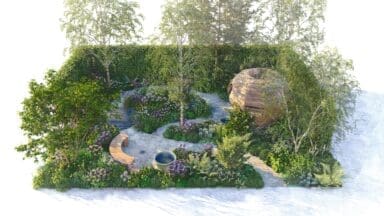
Designed by Duncan Hall and Nick Burton of Burton Hall Garden Design, the RHS Chelsea Flower Show Down’s Syndrome Scotland Garden was inspired by Hall’s nephew Liam, who has Down’s syndrome.
Supported by Project Giving Back, the garden hopes to help challenge the misconceptions and barriers faced by people in Liam’s community and encourage a change of perceptions so people with Down’s syndrome can fulfil their life potential.
After RHS Chelsea, the garden will be relocated to the garden managed in a partnership with Down’s Syndrome Scotland (DSS), by the charity Watch US Grow, at Palacerigg Country Park, North Lanarkshire, Scotland. DSS support Liam and his family. Once relocated the garden will support young people and adults with additional support needs to learn new skills, grow in confidence, gain horticultural qualifications and become more independent.
According to the DSS, the Down’s syndrome community are very much involved in the garden. Liam’s school have been planting bulbs for the garden, designing cushions for building and charmingly knitting socks, which will hang as bunting in the garden. Three adult helpers will be coming to help build the garden, and several DSS members with Down’s syndrome will also be involved in the construction of the garden when relocating to Scotland.
Chief Executive of Down’s Syndrome Scotland, Eddie McConnell said, “We are incredibly proud, as a small Scottish charity, to throw a spotlight on the amazing people in our Down’s syndrome community through our RHS Chelsea Flower Show garden. None of this would be possible without the generous support of Project Giving Back. We want the garden to spark meaningful conversations about the challenges, barriers, and misconceptions that people with Down’s syndrome face, so that they can achieve in life what matters most to them. Duncan and Nick have captured the spirit of people with Down’s syndrome brilliantly in their garden design while not shying away from some uncomfortable truths – people with Down’ syndrome, like so many disabled people, still face prejudice and discrimination and that needs to stop.”
Garden design and planting
Designed showcase many of the characteristics prevalent in people with Down’s syndrome; fun, mischief, empathy, compassion and sensitivity, the garden is filled with a multitude of poignant features.
An immersive, semi-wooded space reflects the unique qualities that people with Down’s syndrome bring to society; the meandering crazy-paving path through two distinct planting areas conveys contrasting moods; a water pool reflects the barrier to progress in the daily challenges faced; a submerged bridge within the water pool depicts overcoming those barriers; to the welcoming shelter designed to look and feel like a comforting hug. The designers added, that Down’s syndrome is caused by a third copy of the 21st chromosome, so the numbers 21 and 3 are subtly referenced throughout the garden.
The garden follows the duo’s naturalistic planting principles, simplicity in design and plant-focused style. In terms of layout the path leads through the semi-wooded part of the garden to a feature building, constructed with colourful decorative tiles scattered into the paving at the entrance, injecting a sense of playfulness. Created by ceramic artist Frances Priest, 21 playful and curious tiles will be inlaid into the paving, contributing to the garden’s sense of joy as visitors enjoy the artful playfulness beneath their feet. The building, created by Old School Fabrications, is organically-shaped and made from locally sourced sustainable timber.
Tall Betula nigra trees, with delicate hanging branches dominate, reflecting a comforting hug, whilst Pinus sylvestris are planted as a (Gaelic) symbol of durability and fulfilled potential. The semi-wooded garden consists of approximately 2,500 plants, split into a greener, calmer zone adjacent to the garden building and a more colourful and playful zone which will include a variety of structural, colourful herbaceous plants representing fun, discovery and joy.
Naturalistic planting includes; Iris sibirica Tropic Night, Primula florindae and Arisaema candidissimum.
“We want visitors to leave the garden challenging the way society views Down’s syndrome and the garden will convey a strong message; if the unnecessary barriers people with Down’s Syndrome face were overcome then they would be able to reach their true potential, something that is very difficult today,” explain Hall and Burton.
The garden will be built by Kate Gould Gardens. Trees will be supplied by Deepdale Trees, and plant by Kelways and Kevock Garden Plants.
Down’s Syndrome Scotland staff member, Cher Collins who has Down’ syndrome said, “I am so excited that we are being given this opportunity – I can’t stop smiling when we talk about the garden.”

